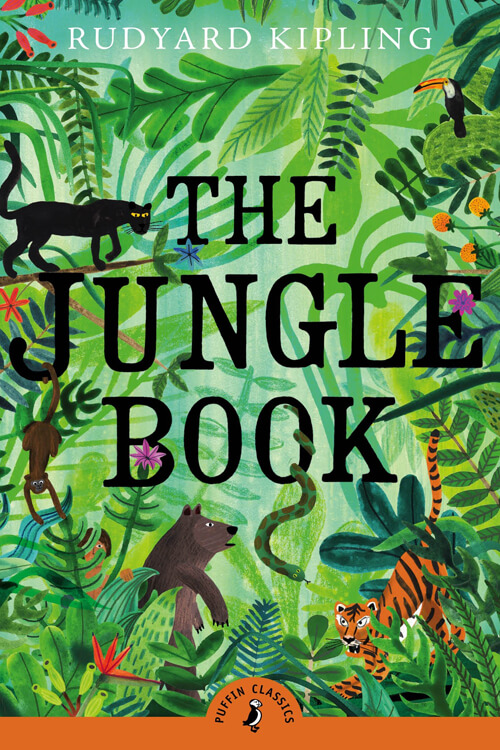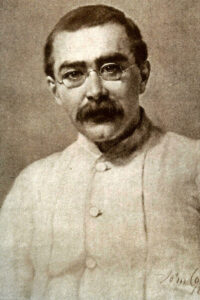
The Jungle Book
Now Rann the Kite brings home the night That Mang the Bat sets free— The herds are shut in byre and hut For loosed till dawn, are we. This is the hour of pride and power, Talon and tush and claw. Oh, hear the call!—Good hunting all That keep the Jungle Law! Night-Song in the Jungle
It was seven o’clock of a very warm evening in the Seeonee hills when Father Wolf woke up from his day’s rest, scratched himself, yawned, and spread out his paws one after the other to get rid of the sleepy feeling in their tips. Mother Wolf lay with her big gray nose dropped across her four tumbling, squealing cubs, and the moon shone into the mouth of the cave where they all lived. “Augrh!” said Father Wolf. “It is time to hunt again.” He was going to spring downhill when a little shadow with a bushy tail crossed the threshold and whined: “Good luck go with you, O Chief of the Wolves. And good luck and strong white teeth go with noble children that they may never forget the hungry in this world.”
It was the jackal—Tabaqui, the Dish-licker—and the wolves of India despise Tabaqui because he runs about making mischief, telling tales, and eating rags and pieces of leather from the village rubbish heaps. But they are afraid of him too, because Tabaqui, more than anyone else in the jungle, is apt to go mad, and then he forgets that he was ever afraid of anyone, and runs through the forest biting everything in his way. Even the tiger runs and hides when little Tabaqui goes mad, for madness is the most disgraceful thing that can overtake a wild creature. We call it hydrophobia, but they call it detainee—the madness—and run.
Read or download Book
Rudyard Kipling
Joseph Rudyard Kipling ( 30 December 1865 – 18 January 1936) was an English novelist, short-story writer, poet, and journalist. He was born in British India, which inspired much of his work.
Biography.
Kipling’s works of fiction include the Jungle Book duology (The Jungle Book, 1894; The Second Jungle Book, 1895), Kim (1901), the Just So Stories (1902), and many short stories, including “The Man Who Would Be King” (1888). His poems include “Mandalay” (1890), “Gunga Din” (1890), “The Gods of the Copybook Headings” (1919), “The White Man’s Burden” (1899), and “If—” (1910). He is seen as an innovator in the art of the short story.
His children’s books are classics; one critic noted “a versatile and luminous narrative gift”. Kipling in the late 19th and early 20th centuries was among the United Kingdom’s most popular writers. Henry James said “Kipling strikes me personally as the most complete man of genius, as distinct from fine intelligence, that I have ever known.” In 1907, he was awarded the Nobel Prize in Literature, as the first English-language writer to receive the prize, and at 41, its youngest recipient to date. He was also sounded out for the British Poet Laureateship and several times for a knighthood, but declined both.
Following his death in 1936, his ashes were interred at Poets’ Corner, part of the South Transept of Westminster Abbey. Kipling’s subsequent reputation has changed with the political and social climate of the age. The contrasting views of him continued for much of the 20th century.
Literary critic Douglas Kerr wrote: “[Kipling] is still an author who can inspire passionate disagreement and his place in literary and cultural history is far from settled. But as the age of the European empires recedes, he is recognized as an incomparable, if controversial, interpreter of how empire was experienced. That, and an increasing recognition of his extraordinary narrative gifts, make him a force to be reckoned with.”






